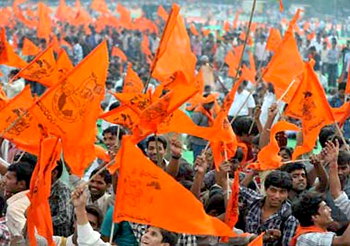Lucknow, Jan 11: With Ayodhya Ram Temple issue bouncing back to the centre stage of Uttar Pradesh politics ahead of the 2017 Assembly polls, VHP has decided to construct temples in every village across the country.

He said from April 15 -- Ram Navami -- the organiation would start a seven-day-long Ram Mahotsava.
"During this period Lord Ram will be worshipped in every village," he told PTI.
Sharma said the target is to reach 1.25 lakh villages.
"We had been observing Ram Mahotsava in the past and the organisation has already reached 70,000-75,000 villages pan India," he said.
Sharma said that during Ram Mahotsava, statues of Lord Ram would be worshipped.
"Whether it is a statue or picture it will be installed at a place after worship," he said.
The Ayodhya Ram temple issue is pending before the Supreme Court but it is again in focus in UP politics ahead of Assembly elections next year.
BJP leader Subramanian Swamy recently exuded confidence that work on the construction of the Ram Temple in Ayodhya would start before the year-end.
He, however, made it clear that the temple would not come up through a movement but only after the court verdict, which he hoped would come by August-September, and with the mutual consent of Muslim and Hindu communities.
Asked if raising the Ram temple issue was linked to Uttar Pradesh Assembly elections in early 2017, he said, "Ram should not be linked with elections. Ram is a matter of faith for Hindus and construction of the temple at Ayodhya is a commitment of every Hindu."
"It's a matter of faith for crores of Hindus in the country and we want to realise the dream of our patron late Ashok Singhal," Sharma said when asked about Swamy's comment.
Singhal had died on November 17 at the age of 89.
Ruling Samajwadi Party in Uttar Pradesh has said that no temple would be allowed to be built at the disputed site in Ayodhya without the court's permission.
Senior SP leader and minister Shivpal Singh Yadav said not a single brick would be allowed to move without the court's nod.
In December last year two trucks of stones arrived in the temple city almost six months after VHP announced its nationwide drive to collect stones for construction of Ram temple in Ayodhya.
"Two trucks of stones have been unloaded at Ram Sewak Puram, a VHP property in Ayodhya, and ‘Shila Pujan’ (praying of the stones) has been performed by Mahant Nritya Gopal Das, the president of Ram Janam Bhumi Nyas," Sharma said.
"Now, the time has come for the construction of Ram Mandir in Ayodhya. Lot of stones have arrived in Ayodhya. And now the arrival of stones will continue. We have signals from Modi government that Mandir construction would be done now," Das had claimed.
Asserting its resolve to build the Ram temple, the VHP had in June last year announced a nationwide drive to collect stones for construction of the temple and had also asked the Muslim community not to pose any hindrance.





Comments
Obviously they remember Hindu now since UP and WB election next year. They start working in WB by communal riots and for UP is temple issue.
Poor Hindu brothers are scapegoat of BJP's political career.
Add new comment